Patience is not always a trait that one thinks of in the
kill-or-be-killed world of popular music. Yet, Finger Eleven’s whole
career has been a tribute to diligence and allowing talent to grow.
The band comes out of the Canadian suburbs in the late
90s. Made up of high school buddies Scott Anderson (vocals), Sean
Anderson (bass), Rob Gommerman (drums), James Black (guitars) and Rick
Jackett (guitars), they started out as a rock/funk band called Rainbow
Butt Monkeys – actually releasing an album under that band name called
Letters to Chutney on Mercury in 1995.
Soon after, the band changed their name to Finger Eleven
(a reference to a line in one of their songs) and moved over to Wind-Up
Records (home of Creed and Evanescence). Gommerman left the band and
was replaced by drummer Rich Beddoe – cementing the current line-up of
the band. Their first two albums, Tip and Greyest of Blue
Skies received much critical love but little notice from the general
public.
However, after years of recording and touring, they first
really captured the world’s attention with the slow-burning popularity
of their 2004 ballad “One Thing.” The song quietly worked its way
higher and higher up the charts, eventually getting to the point that
you couldn’t turn on a radio without hearing it in early 2005.
Their latest single, the hard-driving funk-rock anthem
“Paralyzer” also took the scenic route to the top of the charts, but has
eventually become even bigger than that song. Released almost a year
ago as the first single of band’s CD
Them vs. You vs. Me,
“Paralyzer” has just in recent months hit saturation rotation on pop and
rock radio.
With that song now one of the biggest hits of 2008, the
band continues to move on, getting ready to release the sweet anti-love
song “I’ll Keep Your Memory Vague” as the follow-up. If it follows
Finger Eleven’s template, it’ll simmer for a while before finally
blowing up in early 2009 – so be the first in your neighborhood to jump
on it now.
Drummer Rich Beddoe gave us a call from the road to tell
us all about life with the band.
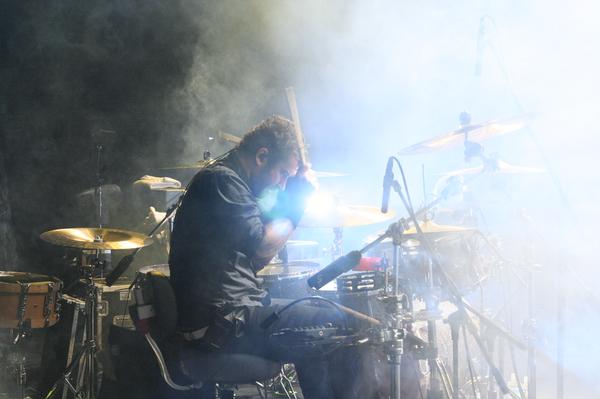 Nice
vague question to start; how did you originally get into music and
drumming?
Nice
vague question to start; how did you originally get into music and
drumming?
I
got started as a kid. I grew up in a very musical family. No one
really played – but always the Beatles on and everyone singing along.
Music was always sort of a happy thing to go to, you know? Then,
drumming, just being a kid it always looked like the most fun, seeing it
on TV. First getting into heavy metal bands and seeing those guys going
crazy. It just looked like a lot of fun, so it sort of happened
naturally. I think I tried guitar first, when I was around nine and
ended up breaking it. I didn’t know how to fix it, so I just started
taking drum lessons.
(laughs)
I was all over the place, man. It was just always a positive thing and
a place to go to when things were tough around the house. That was the
thing you did when you were upset.
The band had been together a little while before you joined on – in fact
I don’t believe you were on the first album the guys did together as
Rainbow Butt Monkeys. I’m not sure if you
were on
Tip,
either.
I
wasn’t. We went back in when I joined the band, because we were signed
in Canada. Right when I joined the band, this big shift happened and we
got dropped and that’s when we signed to Wind-Up. So we re-released
Tip
and I kind of went in and we changed a couple of things
on the record, but nothing substantial.
How did you hook up with the band?
I
was playing in a band – just a local bar band. I’d always be in an
original band and it never worked out. I tried sending demos to record
companies my whole life. I got to a point where I didn’t really want to
work, so I would just play drums for money for people. I just learned a
bunch of songs and go to bars and do these three sets a night. I heard
about the band looking for a drummer through a friend of mine that was
actually teaching our bass player. This really great bass player I know
was also a teacher. He was teaching Sean [Anderson]. Sean told him to
put the word out, so he let me know. It was a very sort of generic
interview. I called the manager up. There was a set time. There was
like 60 drummers to audition. So, it was a very sterile audition
environment. Totally awkward.
(laughs)
It all kind of worked out. I think as soon as we hung out – the music
was fine as far as playing together. Obviously it was brand new for me,
but it was more just the chemistry. Joking around, half the time we
just sat there chatting about ourselves – where we come from. I think
that’s what really makes a band. Right now we’re sitting in the bus.
You’ve got to be able to live in a bus with six other men. That’s what
really makes a band and makes you know if you want someone in your
band. That’s how it all went down.
You had been recording and playing for years with only limited notice a
few years ago when “One Thing” hit. How surreal was that, to suddenly
be all over the radio and everything?
It was weird, but I think when you’re right in
the middle of it… usually when things take off for any band it’s usually
when you’re right when you’re in the thick of touring. In some ways you
don’t get a chance to really appreciate it until you get home, because
you’re just so busy. It’s really when we got home and your friends and
family start to tell you, ‘Wow, man, things are going well.’ That’s
when you start to realize what is going on. It’s still like that now,
with ‘Paralyzer.’ Last year we toured for ten months pretty much
nonstop and then got home for Christmas and everyone was like, ‘Holy
shit, you guys are huge. Congratulations!’ It was like, what are you
guys talking about? We’re just working. Nothing has changed. Then
you’re driving your car around and you hear ‘Paralyzer’ 50 times a day
and go like, holy shit!
(laughs) So you have to experience it yourself to
really see the scope of what’s going on.
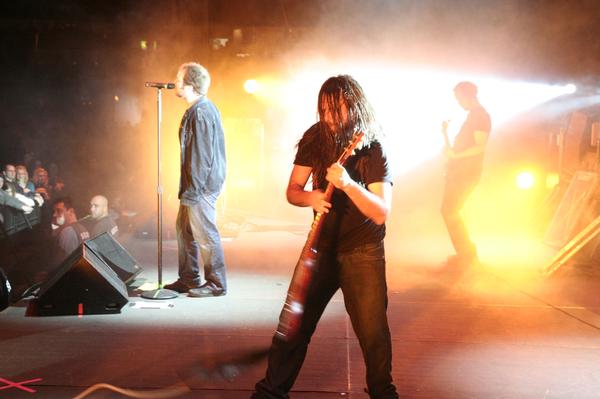 Just
like the last album,
Them vs. You vs.
Me
was out for a while before “Paralyzer” hit. Were you surprised it took
so long to catch on? Had you pretty much given up on having a hit from
the album?
Just
like the last album,
Them vs. You vs.
Me
was out for a while before “Paralyzer” hit. Were you surprised it took
so long to catch on? Had you pretty much given up on having a hit from
the album?
No, I just think it just takes time. That happens with a lot of bands.
Like you said, ‘One Thing’ was the same thing. We always had managers
and label guys around us telling us, ‘Man, it’s doing great. Doing
great! It’s gonna get there.’ Six months go by and they’re still
saying it. There was never a period where they were, ‘uh… I don’t know,
man.’ It was always – even though it took a year or so to really get
going strong, that whole year was still positive. We were still getting
radio adds. We were still touring. It was a nice slow build, which in
some ways is better than an overnight hit song. You can ride it out
longer. You can stay on the road longer. You can see it all happen
gradually as opposed to all of the sudden waking up one day and you are
playing in front of 5,000 people. Not that we’re playing in front of
5,000 people, but you know what I mean.
One thing I really like about
Them vs. You vs.
Me
is that the band is really experimenting with a lot of styles.
“Paralyzer” is very funky dance rock, ballads like “Change the World,”
acoustic ballads like “I’ll Keep Your Memory Vague,” there were even
some touches of country. Were you looking to experiment with styles on
the CD?
We
were. I don’t know if we were looking to do anything but just not have
any rules or not have any laws about how we wrote songs. I think with
every album we sit and write it becomes more experimental – just because
we are getting older and more mature and we’re listening to more new
sounds. Music is just so vast. You can keep discovering stuff. Every
time we have time to sit at home and listen to more records and write
songs, different guys bring more stuff to the table. It’s never a
conscious decision to go ‘we’re gonna change this today.’ We just get
in a room and depending on one guy’s mood and another guy’s mood – that
sort of will define what kind of sound you’ll write that day. If
everyone’s feeling depressed and it’s raining out, maybe you’ll write a
ballad. Or maybe you’ll write a ‘Paralyzer’ type of song. Who knows?
It’s always based on that kind of stuff.
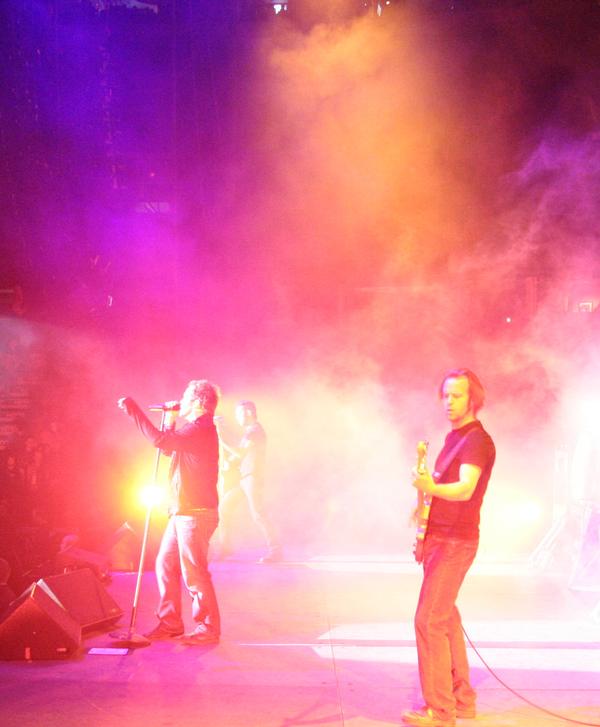 How
does the band handle writing the songs? Is it all a big collaborative
thing where certain people do certain things?
How
does the band handle writing the songs? Is it all a big collaborative
thing where certain people do certain things?
Someone [always] brings something to the table, but the way that happens
is different. There can be the generic way of sitting in a room and
making noise in a circle and then hashing out an idea. [Or] we were
sending files back and forth to one another from home over the
internet. Someone can have a guitar idea and send it over to me. I
could put a drum part down and send it over to Sean, who’d put a bass
part down. By the end of the day, not even seeing each other you could
have this skeletal idea of a song. A few guys – guitar player and
singer – would go away and just jam stuff up with acoustic. Maybe go
back and really get back to the roots of the song and jam it out with an
acoustic guitar and rediscover a song. There’s a bunch of ways a song
comes to be with a band, but at the end of the day, everyone usually has
some form of a stamp on it – each guy in the band.
It
seems like on the new CD, when the songs turn to life like “I’ll Keep
Your Memory Vague,” “So So Suicide,” “Window Song” and “Paralyzer,” they
seem to be pretty downbeat. As a songwriter, do you find being troubled
more interesting than being happy?
Well, that’s a lyrical question. Scott [Anderson] writes all the
lyrics. That definitely depends on what he’s feeling and what he’s
going through in life. I think you can definitely look into Scott’s
soul with every album and see what he’s going through. We also offer up
a song – if it’s a more aggressive song like ‘So So Suicide’ – that
probably conjures up certain things for him to write about as well. The
whole process sort of affects one another and defines if you’re going to
have a heavy song or a slower song. It’s just how everyone presents the
song to one another – the emotions will come out. But certainly,
lyrically speaking, you can kind tell what Scott goes through each time
he writes a record, with his relationships and his frustrations or with
his happiness about things. It’s always cool for us to hear his rough
ideas of a song. We’re like,
“Holy
shit, dude. Are you all right?”
(laughs)
It’s almost like therapy. If he needs to say something, he can show us
a new song and we can go,
“Oh,
holy shit. I didn’t know you were going through that, man.”
“Paralyzer” is a pretty searing indictment on the club culture. Was
there anything in particular that inspired
Scott for that song?
That was a great one, because I think it’s something the whole band
feels. We’ve never felt comfortable in dance clubs. Sometimes you end
up at them on the road or with friends at home. You’re always the guy
in the corner that feels awkward and just drinks too much and then says
something stupid and goes home lonely.
(laughs)
We
were all coming from that place, so when he wrote that song, it was
like, ‘Oh, man. It’s so cool that finally that’s being said.’ It
really defined what we’ve all gone through. I don’t know if he’s had a
particular experience about that or just it’s every fucking time you go
to a bar that’s what happens. Obviously there is a big difference
between like a pub and a club. We belong in a dirty little bar in the
corner drinking. That’s our place – where we feel comfortable. A bunch
of laser lights and girls dancing to Lil’ Wayne – we’re screwed.
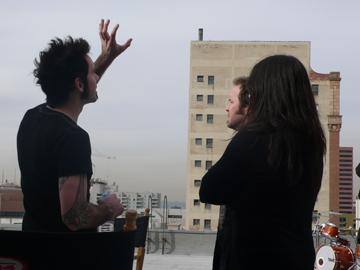 I’ve
started hearing “Falling On” on the radio. Is that the second single?
I’ve
started hearing “Falling On” on the radio. Is that the second single?
It
is the second single, but we put that out there just to get something
out there on rock radio. ‘I’ll Keep Your Memory Vague’ is going to be
the next big, pushed single. Because ‘Paralyzer’ has been going so long
on so many different charts – rock and pop – and we just wanted to give
the rock stations something to play. It’s certainly a single, but it’s
not going to be given as much of a push as ‘Paralyzer’ has. But it’s
great you’re hearing it. It’s doing pretty well, considering that the
label guys aren’t going crazy pushing on it. It’s cool.
Does the band have an input on what is going to be a single, or does the
label decide that?
We
all have an input. We’ve been at it long enough that when we finish a
song in the studio, you sort of can go, ‘Man, that one can be a
single.’ You can sort of tell over the years what’s going to work and
what will not. We definitely have album track songs that we know
there’s no way they’re going to be singles. Sometimes they are the most
fun, because you can make a seven-minute song and don’t even think about
the radio. But, I think at the end of the day, business-wise, the label
sort of picks. But everyone has an opinion. Basically, no one has ever
put out a single that we were like, ‘You can’t do that.’ Everyone they
have ever picked was the logical choice. That’s why the record company
is good at what they do. That’s their job.
As
a drummer, which track did you enjoy laying down the most?
‘Sense of a Spark’ is really cool because in the verse it’s got the
really sort of wacky verse-drum part. We actually wrote that song for
the last record and Scott never wrote anything for it, so we sort of
just left it. But we just always felt something about it. So, when we
were writing for this record, we asked Scott to take another look at
it. Thankfully, he was inspired to write a verse and a chorus. It’s
cool it made the record. So, yeah, ‘Sense of a Spark’ I think for me is
the most fun drum line.
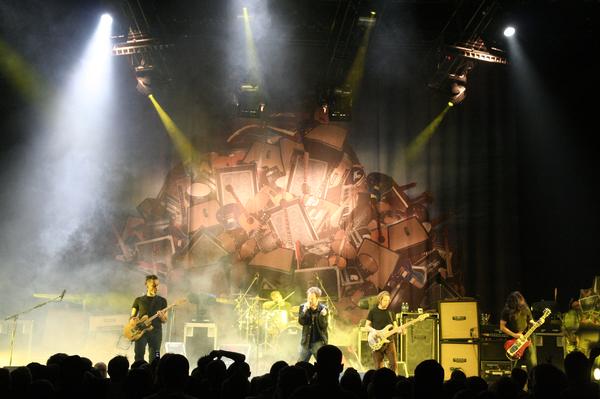 Speaking
of that, I read that you guys had done like a hundred songs for the
album and then had to cut back to eleven. How did you decide what would
come on and what wouldn’t and do you think any of the other songs will
ever be released down the line like “Sense of a Spark” was?
Speaking
of that, I read that you guys had done like a hundred songs for the
album and then had to cut back to eleven. How did you decide what would
come on and what wouldn’t and do you think any of the other songs will
ever be released down the line like “Sense of a Spark” was?
I
hope so. Like, when you say 100 songs, there are always different
variations. A lot of them were just acoustic ideas that one or two guys
were concepting. But I’d like to think that some of those ideas we can
look at for the next record and still make use of. Like you were just
saying, with ‘Sense of a Spark,’ but then there’s other songs, you just
scrap them, you know? You have to learn when to go back to a song and
when to just say, okay, let that one die.
On the subject of unreleased tracks, I wrote a
biography of Tori Amos.
Oh, cool.
When I was researching it, I found that you guys recorded a cover of
“Precious Things” that never got released.
Yeah. Yeah.
Why did you decide to do that song and why didn’t it ever see the light
of day?
It was at the point where when we did that – I mean we
are all massive Tori Amos fans. Little Earthquakes is… or was
that Under the Pink? Which one was I…? Little Earthquakes
is one of my favorites.
Yeah,
Little Earthquakes was the debut
CD with “Precious Things” on it…
Yeah, I was just thinking of that whole record. I was
just sort of reminiscing in my brain there, how much I like that.
(laughs) We always were a fan of that song. She kind of blows that
straw on that song. There are so many cool production things on that
song. We were just at the point where we did it were, I think, we just
did it for fun. I don’t think we were big enough yet that the label
sort of wanted to jump on it and release it. We were still sort of
struggling to release our own songs. I think there’s a demo out there
somewhere. Like we were just saying about other songs that we’ve
written before, maybe that’s one of those things that we can still
release somewhere someday. It’s still there and it’s recorded.
Yeah, maybe a bonus track…
Yeah, exactly.
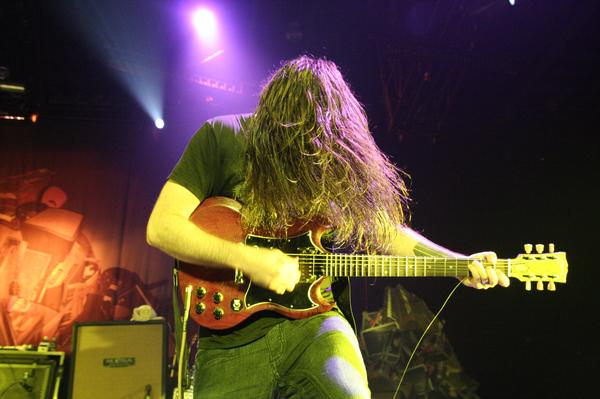 There
are so many new alternate ways to get your music out there. You guys
have been on TV, video games, the internet, you’ve even been in
wrestling videos. Do you think that makes it easier for a band to
capture an audience?
There
are so many new alternate ways to get your music out there. You guys
have been on TV, video games, the internet, you’ve even been in
wrestling videos. Do you think that makes it easier for a band to
capture an audience?
It
does. Whether it’s easy or not, it’s just another form of getting
people to know who your band is – especially in this day and age where
the label is in some ways just dying around us. Radio is a struggle.
Radio has always been a struggle to get a hit, but now even if you have
a hit it still doesn’t necessarily mean your record. I think the more
sort of industries out there – such as wrestling and video games – that
you can get people that you can get people to realize who you are, the
better. Having said that, you also don’t want to attach your name to
some things you don’t believe in. We’ve been asked to do tons of things
that probably would have been a good idea as far as getting eyeballs
looking at you, but we just didn’t believe in them. Like, we’re not
going to do a cigarette company commercial. We don’t smoke. I mean
we’re not anti [smoking]… we will smoke weed, but we don’t want to do a
cigarette commercial, even if it can pay us a million bucks. We’re just
not going to do it. You have to pick and choose, but you can’t be too
picky. I’ve been a wrestling fan since I was a kid, but now I think
it’s sort of hokey-pokey. Doing a song for Kane was fun. I don’t know
if everyone in the band loves wrestling, but they realize how huge it
is.
(chuckles)
With that being said, sometimes songs get used in ways where… because we
signed up with wrestling, they decided to use ‘One Thing’ as a tribute
to Chris Benoit. We basically did a tribute for a killer. Like, fuck,
who gave someone permission to use our music to fucking tribute a
fucking killer? So when you license your song to something like WWE,
you have to keep a close eye on where they use it. But that’s Vince
McMahon; he’s sort of a scoundrel anyway.
Nowadays musicians have so many more ways to reach out to
their fans, the forum on the official site, your MySpace page. In your
career, MySpace played a huge part in getting you guys noticed. What is
it like being able to reach the fans like that?
It’s just one of those necessary things, you know? It
takes a little more effort these days to be in touch with your fans,
because you’ve got to take advantage of your MySpaces and your Facebooks
and all that kind of stuff. So in some ways it’s a little more work for
bands, but in this day and age it’s one of those things I think you need
to do. First of all, just let fans know you are paying attention.
Because you can like someone’s music – I know for myself in the past,
you can like someone’s music but if you try to meet them backstage and
they’re a dick, or you try to reach out to them now on the internet and
they are nonresponsive, you can quickly find another band you like –
real easy. It’s as important for us for fans to buy your record as it
is for a band to say, ‘Hey, thanks for buying my record.’ Whether it is
in person or online, just basically show them you give a shit, because
there are a million bands to choose from. To know that you are the one
of them they like, you really have to hold onto that more than ever
these days.
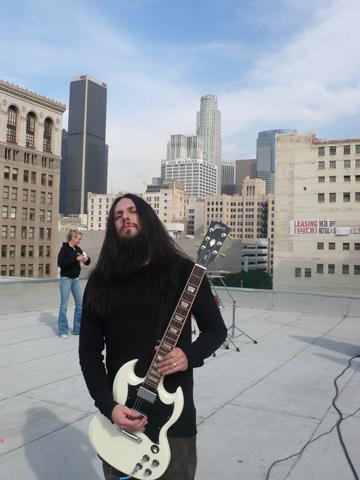 One
thing I like about the band is that you are hard, but you aren’t afraid
to have a tune. Years ago when you guys were first starting, it was
considered something of a sell-out for a rock band to have a melody.
Why do you think the world is so ready for more melodic rock?
One
thing I like about the band is that you are hard, but you aren’t afraid
to have a tune. Years ago when you guys were first starting, it was
considered something of a sell-out for a rock band to have a melody.
Why do you think the world is so ready for more melodic rock?
Well, first of all, I think it’s a testament to how long of a career
we’ve had, which is amazing. But, hey, trends have changed. That’s
just one of a million changes over the years. Every few years something
changes. That’s why you have these new titles like nu rock or nu metal
– all this shit. There are always new titles because people are trying
to figure out what is different about these new bands. I think the
reason that bands like Limp Bizkit died away… I just think there was an
overflow of guys not singing enough melody. There was just a bunch of
rapping. I mean, that whole rap/rock thing, it was a really cool new
thing. Especially in the beginning, no one had really heard it before,
but now, it’s so done now. Everybody did it for so many years and
overdid it. I think people want melody again. People like to sing
along to songs on the radio. Everyone in the world does. Maybe for a
while there, people liked to rap along to a Limp Bizkit song. But at
the end of the day it’s always going to come back to a melody. I think
it was just a matter of time. Just a phase. I think something else
will come along. A lot of the screaming, I find, a lot of these new
kind of emo bands with the crazy screaming guy you can’t understand it
sort of like the new rap/rock. There’s a million of these bands where
the guitar player sings and the singer guy just scream-o’s, you know?
There are a lot of bands I like. There’s a Canadian band called
Alexisonfire that do it and they’re really awesome. But, it’s hard to
imagine it in ten years. (laughs) You know, it’s hard to
imagine those bands on their fourth record and still doing it. At some
point, I think, singing just always comes back. Melody has always been
there since the start of time, so there will always be trends, but
melody will always remain.
In the end, how would you like people to look back on
your music?
If it was all said and done, I’d like people to know
there is a band that cared about their music. There is a band that
probably didn’t have as much success as they could have because of how
much they cared. Because they didn’t follow the trends. There was a
band that took chances on their own songs and changed every time – even
though they probably lost, and sometimes gained, fans. There’s a band
that took chances for the sake of the music, as opposed to the sake of
their own careers.
Are there any misconceptions you'd like to clear up?
Umm… No. I mean I don’t think so. (laughs)
We’ve always been pretty good about not having too much drama with our
band. You know what you get when you meet us. We do our thing
onstage. We all kind of go into mode and play. We’re just normal
Canadian dudes that write songs and rock out for a living.